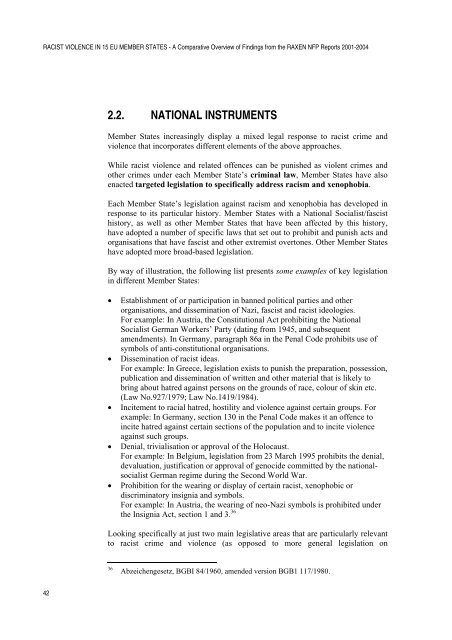RACIST VIOLENCE IN 15 EU MEMBER STATES - Cospe
RACIST VIOLENCE IN 15 EU MEMBER STATES - Cospe
RACIST VIOLENCE IN 15 EU MEMBER STATES - Cospe
Create successful ePaper yourself
Turn your PDF publications into a flip-book with our unique Google optimized e-Paper software.
<strong>RACIST</strong> <strong>VIOLENCE</strong> <strong>IN</strong> <strong>15</strong> <strong>EU</strong> <strong>MEMBER</strong> <strong>STATES</strong> - A Comparative Overview of Findings from the RAXEN NFP Reports 2001-2004<br />
2.2. NATIONAL <strong>IN</strong>STRUMENTS<br />
Member States increasingly display a mixed legal response to racist crime and<br />
violence that incorporates different elements of the above approaches.<br />
While racist violence and related offences can be punished as violent crimes and<br />
other crimes under each Member State’s criminal law, Member States have also<br />
enacted targeted legislation to specifically address racism and xenophobia.<br />
Each Member State’s legislation against racism and xenophobia has developed in<br />
response to its particular history. Member States with a National Socialist/fascist<br />
history, as well as other Member States that have been affected by this history,<br />
have adopted a number of specific laws that set out to prohibit and punish acts and<br />
organisations that have fascist and other extremist overtones. Other Member States<br />
have adopted more broad-based legislation.<br />
By way of illustration, the following list presents some examples of key legislation<br />
in different Member States:<br />
• Establishment of or participation in banned political parties and other<br />
organisations, and dissemination of Nazi, fascist and racist ideologies.<br />
For example: In Austria, the Constitutional Act prohibiting the National<br />
Socialist German Workers’ Party (dating from 1945, and subsequent<br />
amendments). In Germany, paragraph 86a in the Penal Code prohibits use of<br />
symbols of anti-constitutional organisations.<br />
• Dissemination of racist ideas.<br />
For example: In Greece, legislation exists to punish the preparation, possession,<br />
publication and dissemination of written and other material that is likely to<br />
bring about hatred against persons on the grounds of race, colour of skin etc.<br />
(Law No.927/1979; Law No.1419/1984).<br />
• Incitement to racial hatred, hostility and violence against certain groups. For<br />
example: In Germany, section 130 in the Penal Code makes it an offence to<br />
incite hatred against certain sections of the population and to incite violence<br />
against such groups.<br />
• Denial, trivialisation or approval of the Holocaust.<br />
For example: In Belgium, legislation from 23 March 1995 prohibits the denial,<br />
devaluation, justification or approval of genocide committed by the nationalsocialist<br />
German regime during the Second World War.<br />
• Prohibition for the wearing or display of certain racist, xenophobic or<br />
discriminatory insignia and symbols.<br />
For example: In Austria, the wearing of neo-Nazi symbols is prohibited under<br />
the Insignia Act, section 1 and 3. 36<br />
Looking specifically at just two main legislative areas that are particularly relevant<br />
to racist crime and violence (as opposed to more general legislation on<br />
36<br />
Abzeichengesetz, BGBI 84/1960, amended version BGB1 117/1980.<br />
42
















